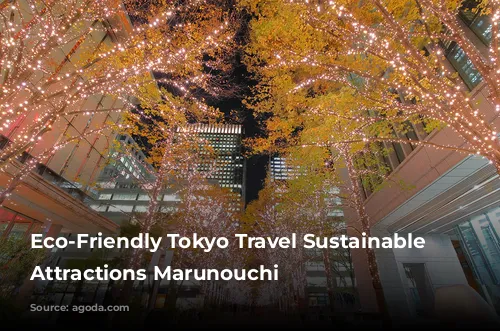Tokyo, a metropolis renowned for its dazzling neon lights and cutting-edge technology, also shines as a beacon of cleanliness and environmental responsibility. You might think of crowded, polluted cities when you hear “metropolis,” but Tokyo is different. From the moment you step off the plane, you’ll notice a marked absence of litter on the streets. This isn’t just a happy coincidence—it’s a testament to the deep-rooted environmental awareness instilled in Japanese society from a young age.
This commitment to environmental responsibility is evident in every corner of the city. You’ll see meticulous waste separation and recycling systems in public spaces like parks and subway stations, making it clear that sustainability is more than just a slogan in Tokyo. It’s a way of life. This eco-conscious mindset extends to the city’s infrastructure, where public transportation isn’t merely a necessity but a preferred mode of travel. The city’s efficient public transportation network, with its extensive use of hybrid vehicles like the iconic Toyota Prius, further underscores Tokyo’s commitment to reducing its carbon footprint.
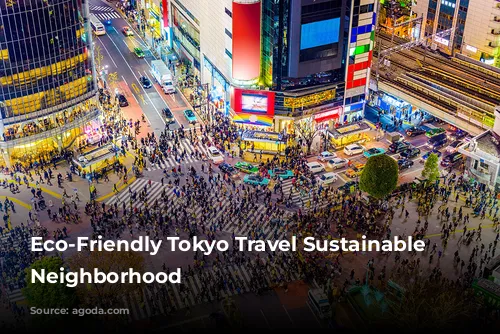
Embracing Tokyo’s Sustainable Spirit: A Traveler’s Guide
As a visitor to Tokyo, you can easily contribute to this sustainable ethos. One of the simplest and most effective ways is to embrace the local practice of waste minimization and recycling. This means carrying your own reusable water bottle, using chopsticks instead of disposable ones, and refusing unnecessary packaging. You can also easily adopt the local habit of using public transportation, which is hailed as the best in the world. The sleek and speedy shinkansen, or bullet train, offers an environmentally friendly way to explore the country, allowing you to enjoy breathtaking views of the Japanese countryside, including the iconic Mount Fuji. For a more intimate exploration of Tokyo, consider hopping on a bicycle, a popular and healthy way to immerse yourself in the city’s vibrant atmosphere.
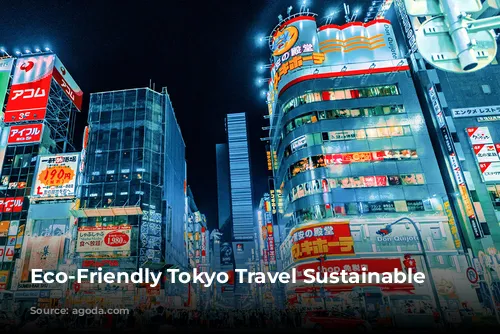
A City Transformed: Tokyo’s Air Quality Journey
The story of Tokyo’s air quality is a compelling tale of transformation. In the 1970s, Japan, like many rapidly industrializing nations, struggled with severe pollution issues. The passage of the Basic Law for Environment Pollution Control marked a turning point, addressing pollution-related health crises. Today, Tokyo, despite transitioning away from fossil fuels, still faces challenges in completely eliminating its dependence on them. While air quality has improved significantly, the city remains vigilant, acknowledging the ongoing threats posed by pollution.
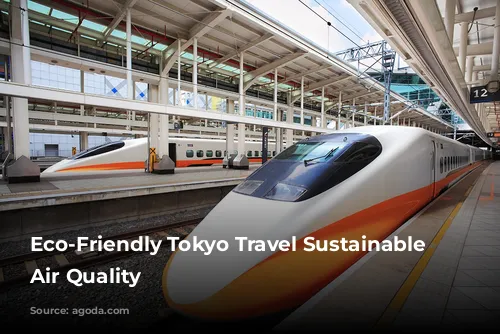
Understanding Japanese Cultural Nuances for a More Meaningful Experience
Japan is known for its structured society where loyalty, politeness, and collective harmony are deeply valued. As a visitor, understanding and respecting these cultural tenets will enrich your experience and foster positive interactions. Japanese society places a high value on personal responsibility, education, and hard work, which is evident in the country’s low crime rates and well-maintained public spaces.
When interacting with locals, remember that a gentle handshake with minimal eye contact is the norm, often accompanied by a respectful bow. Nodding during conversations is essential, signifying understanding and respect. Dressing conservatively, avoiding loud conversations, and refraining from public displays of affection will help you align with local customs.
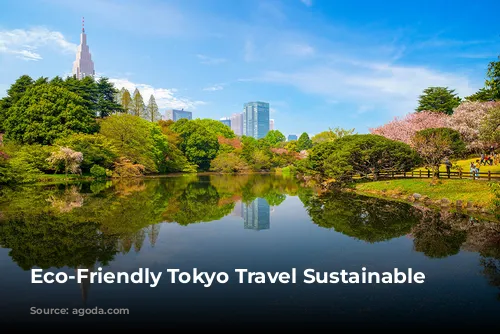
Supporting Local Businesses: A Sustainable Travel Choice
One of the most impactful ways to contribute to sustainable travel in Tokyo is by supporting local businesses. This means choosing to stay at locally owned hotels, dine at organic restaurants, and purchase from local artisans. You’ll enjoy an authentic experience while promoting sustainable economic practices. The city offers numerous opportunities to engage in eco-friendly activities, from visiting farmers’ markets to participating in community-centered experiences that highlight sustainable living.
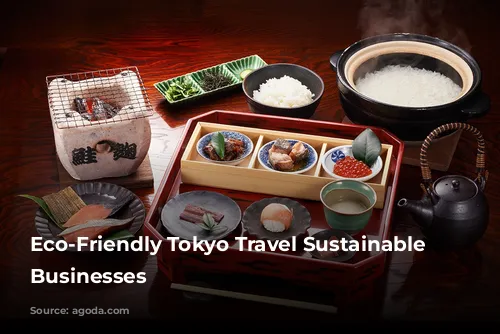
Sustainable Accommodation Options: From Luxurious to Budget-Friendly
When it comes to eco-friendly accommodations in Tokyo, there’s a wide range of options to suit every taste and budget. If you prefer to stay in vibrant neighborhoods, consider Shinjuku and Shibuya, which are not only central to Tokyo’s nightlife and shopping but also offer easy access to green transportation options.
Tokyo’s hotel scene seamlessly blends luxury and sustainability. The Imperial Hotel Tokyo and the Palace Hotel Tokyo are prime examples of this, offering luxurious amenities while upholding sustainable practices. The Imperial Hotel, with its rich history and elegant design, is a landmark in itself. The Palace Hotel Tokyo, conveniently located just 1.3 miles from the city center, provides guests with easy access to major attractions and green amenities.
For those seeking accommodations near Tokyo’s famous landmarks, there are numerous hotels near Tokyo Tower and Tokyo Station that offer comfortable and sustainable lodging options. The Tokyo Station Hotel, for instance, is a luxurious establishment offering stunning views and is situated in the Marunouchi district, known for its upscale shopping and dining.
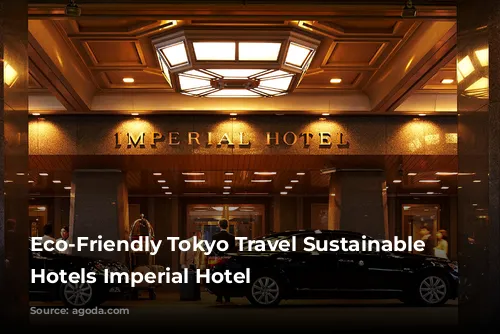
Furthering Your Sustainable Journey in Tokyo
Visitors to Tokyo can take their commitment to sustainability a step further by participating in various green initiatives. Engaging with grassroots organizations dedicated to environmental preservation and opting for carbon offsetting for flights are effective ways to make a positive impact.
From its spotless streets to its commitment to public transportation, Tokyo offers a model for sustainable urban living. By embracing the local practices and supporting eco-conscious businesses, travelers can contribute to the city’s ongoing efforts to protect its environment and create a more sustainable future.
